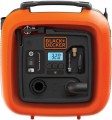Power source
Rated supply voltage used by the electric compressor (see "Type"); in fact, the types of networks with which the device is compatible.
—
12 V. Standard on-board voltage for passenger cars and similar vehicles such as light trucks and many motorcycle models. 12V compatibility is almost mandatory for modern compressors (only a few models are not capable of operating on this voltage). However, note that the methods of connecting to on-board networks may be different; see "Connection" for details.
—
24 V. A voltage of 24 V is typical for on-board networks of heavy equipment — trucks, buses, etc., as well as some powerful SUVs. In compressors, compatibility with this supply is usually provided in addition to 12 V; Pure 24-volt models are extremely rare.
—
230 V. Connecting to a regular 230 V household outlet. Most often, this option is used as a spare, in addition to 12 V — so that if there is a nearby outlet, the compressor can be powered from it without loading the car battery and without wasting fuel on the on-board generator. However, there are models that use only 230 V — they are designed for stationary use in tyre shops, service stations, etc.
—
Battery. Powered by a removable or built-in battery, it gives you the freedom to use the compressor and allows you to get rid of its hard wire connect
...ion to the on-board car network or a household outlet. However, a dead battery will still have to be charged sooner or later. And in this matter, you can not do without a wired connection. Keep in mind that the battery may not be included in the standard package of some rechargeable autocompressors and will need to be purchased separately.Performance
The capacity of the compressor (see "Type") is the maximum amount of air that it can pump into the tyre in a minute.
Higher performance reduces the time required to inflate the wheel; on the other hand, this parameter directly affects the dimensions, weight, power consumption and price of the compressor. So it is worth choosing according to performance, taking into account real needs. So, for a “duty” tyre inflation in a passenger car, a compressor with a low operating speed is quite enough — up to
20 L / min inclusive. And if the speed of full pumping is also important for you (for example, after replacing the rubber) — you can choose a unit for
21 – 40 L / min. In turn, models with more solid characteristics —
41 – 60 L / min and
more — are intended mainly for heavy equipment like SUVs, trucks, tractors, etc.
Separately, it should be noted that this parameter is NOT suitable for calculating the exact inflation time (even if the exact volume of air in the wheel is known). The fact is that the actual performance of the compressor is always lower than the claimed one: the figures in the characteristics are indicated for free air outlet, and when pumping the wheels, the pumping speed will inevitably be lower due to the resistance of the nipple.
Current consumption
The amount of current drawn by the compressor during operation. For most models intended for use with passenger cars, this indicator is at the level of 12-14 A. A small current consumption is preferable from the point of view of energy saving, but the performance of the device largely depends on this indicator (see "Performance").
Power cord length
The length of the cord with which the compressor is connected to a power source — a standard car socket DC 12V (so-called cigarette lighter) or directly to the battery terminals. It is believed that the length of the cable should not be less than two metres to avoid inconvenience in operation.
Hose length
The length of the hose through which air is pumped into the tyre. The larger it is, the more convenient the device is to use. But it is rare that the compressor is left far from the wheel, especially if a pressure gauge is placed on the device, which must be periodically checked. For domestic use in cars, a one and a half metre long hose is enough. Powerful and performant models can be equipped with a hose of 7 metres or more, but these are more solutions for commercial use in car services.

